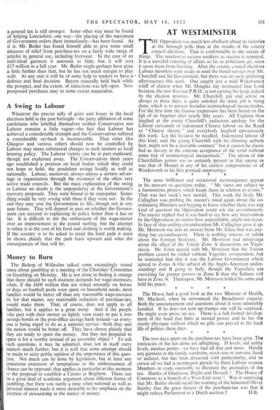Money to Burn
The Bishop of Willesden talked some exceedingly sound sense about gambling at a meeting of the Churches' Committee on Gambling on Monday. He is not alone in finding it strange that there should be such insistent demands for wage-increases, when, if the £600 million that are risked annually on horses or dogs or football pools were spent on household needs, most families would be better off than any reasonable wage-increase or, for that matter, any reasonable reduction of purchase-tax, would make them. That, of course, does not apply to all families, but it applies to a great many. And if the people who part with their money so lightly were ready to put it into savings bonds or the post-office savings bank instead—as every- one is being urged to do as a national service—both they and the nation would be better off. They have shown plainly that they are ready to spare the money. Are they not prepared to spare it for a worthy instead of an unworthy object ? To ask such questions, it may be admitted, does not in itself carry matters much further, but it is well that some attempt should be made to seize public opinion of the importance of this ques- tion. Not much can be done by legislation, but at least any gratuitous extension of temptations to the enthronement of chance can be opposed; that applies in particular at this moment to the proposal to establish a Casino at Brighton. There can be a good deal of academic argument about different forms of gambling, but there was rarely a time when national as well as personal interest made it more desirable to lay emphasis on the doctrine of stewardship in the matter of money.


































 Previous page
Previous page